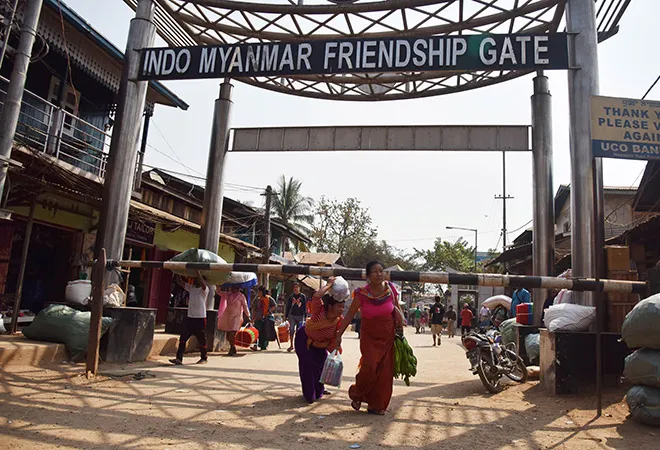
The political upheaval in Myanmar following the military coup in February 2021 has created a complex and precarious situation for human trafficking between India and Myanmar. India shares a
1,642-km porous border with Myanmar. The instability, unrest, and power struggles within Myanmar have given rise to criminal syndicates that exploit vulnerable individuals and profit from illicit activities.
As stated by V Muraleedharan, the Minister of State for External Affairs, more than 400 Indian men in fraudulent IT jobs are stuck in Myanmar.
This issue was also
highlighted by the recent tweet by Indian External Affairs Minister, Dr. S Jaishankar, after a meeting with his Myanmar counterpart H.E. U Than Swe during the Mekong Ganga Cooperation (MGC) gathering in Bangkok on 16 July. Concerns about human and drug trafficking were emphasised, calling for stronger collaboration among relevant parties to ensure the prompt return of trafficked victims.
The instability, unrest, and power struggles within Myanmar have given rise to criminal syndicates that exploit vulnerable individuals and profit from illicit activities.
To understand this concern, there is a need to examine the deteriorating human trafficking conditions along the India-Myanmar border post-coup and the challenges faced by authorities in combating this growing menace.
Employment scam
One of the most significant trends observed in post-coup human trafficking is the promise of fake IT occupations in Thailand, with salaries that seem too good to be true. According to reports, the syndicates' modus operandi involves enticing IT-skilled youths with the promise of lucrative data entry careers in Thailand, with monthly salaries
ranging from US$5,000 to US$8,000. These attractive job opportunities are advertised on social media platforms and through recruiting agents based in Dubai and India.
The “recruits” (mostly belonging to the Indian state of Tamil Nadu) are then transported to Thailand using the visa-on-arrival facility. Upon arrival, they are taken to Mae Sot in Tak Province. Under the cover of night, they are made to cross the Moei River to illegally enter Myawaddy. Once in this remote bordering state, they are coerced into
working as scammers within the facilities set up by the syndicates.
One of the most significant trends observed in post-coup human trafficking is the promise of fake IT occupations in Thailand, with salaries that seem too good to be true.
Fortunately, a significant number of those held captive have managed to maintain communication, and authorities are in contact with them. The harrowing tales of the rescued victims about not being provided proper food, sleep, or sanitary conditions have been quite disturbing. They were overworked and severely punished for not meeting appropriate targets.
Challenges faced by Indian authorities
The Indian government, particularly the Ministry of External Affairs, is confronted with multifaceted challenges in addressing human trafficking issues. The Myawaddy region, where the trafficking issue is the worst, is located within Myanmar's Kayin province which shares a border with Thailand. In this remote area, armed militia groups hold greater control, limiting the influence of Myanmar's military government. As a result, New Delhi encounters numerous intricate challenges in its efforts to rescue the stranded Indians.
The lack of cooperation from the Myanmar authorities due to the ongoing political crisis hampers effective collaboration in tackling this issue. Additionally, the vast and difficult terrain along the border poses challenges in patrolling and securing the area adequately.
Despite the daunting challenges, Indian authorities, along with the Indian missions in Bangkok and Yangon, have been actively working to rescue the victims and repatriate them to India. The collaboration between different agencies and law enforcement bodies has resulted in the
successful rescue of 292 individuals who have been brought back to India through repatriation efforts. However, many still remain trapped.
The Myawaddy region, where the trafficking issue is the worst, is located within Myanmar's Kayin province which shares a border with Thailand.
Bureaucratic and administrative delays also remain a major concern. The process usually involves the rescued victims crossing into Thailand. Upon reaching Thailand, the Thai armed forces detain them due to their illegal entry since the captives lack proper travel documentation to enter Myanmar, and their return to Thailand is also not legally recognised. As a result, Indian diplomats are faced with the challenging task of persuading the relevant authorities to recognise those rescued from Myanmar as victims of a human smuggling racket. This process involves extensive time and documentation efforts.
Points of deliberation
Enhancing collaboration between border control agencies and establishing direct communication channels between India and Myanmar can serve as a potent strategy to combat trafficking in persons and foster cross-border and regional cooperation. This was the very reason for the
Memorandum of Understanding (MoU) that was signed between India and Myanmar in 2019 for enhancing bilateral cooperation on the prevention, rescue, recovery, and repatriation of persons who have been trafficked. However, the toppling of the civilian government made it difficult to understand whether the military government will honour the MoU and the clauses set within it that includes ensuring speedy investigation and prosecution of traffickers and organised crime syndicates in either country, and also setting up Working Groups/ Task Forces to make efforts to prevent human trafficking.
The solidification of legal frameworks to tackle trafficking also needs to be ensured. While both nations have enacted laws that criminalise trafficking and protect victims and have also ratified international conventions related to human trafficking, the current political instability hinders proper and prompt measures to ensure the safety and protection of trafficked victims. In this regard, improved coordination between India and Myanmar’s law enforcement agencies is essential to effectively combat trafficking. Joint operations and intelligence sharing can help intercept traffickers and rescue victims.
While both nations have enacted laws that criminalise trafficking and protect victims and have also ratified international conventions related to human trafficking, the current political instability hinders proper and prompt measures to ensure the safety and protection of trafficked victims.
Additionally, raising awareness about the risks of trafficking and educating potential victims about the signs of exploitation are crucial steps in combating this issue. A
delay in the publication of the advisory on fake IT jobs was noted and, thus, such negligence in the future needs to be addressed. Dissemination of reliable information is critical to restrict the spread of trafficking networks from preying on individuals. Alongside rescue efforts, it is equally important to provide rehabilitation and support to the victims to help them reintegrate into society and rebuild their lives after such traumatic experiences. Proper psychological evaluation and treatment will be essential in this regard.
Addressing this complex issue requires concerted efforts from both India and Myanmar, along with international cooperation, to ensure the safety and well-being of the victims and to combat this grave violation of human rights.
Sreeparna Banerjee is Junior Fellow with the Strategic Studies Programme at the Observer Research Foundation
The views expressed above belong to the author(s). ORF research and analyses now available on Telegram! Click here to access our curated content — blogs, longforms and interviews.



 The political upheaval in Myanmar following the military coup in February 2021 has created a complex and precarious situation for human trafficking between India and Myanmar. India shares a
The political upheaval in Myanmar following the military coup in February 2021 has created a complex and precarious situation for human trafficking between India and Myanmar. India shares a  PREV
PREV


